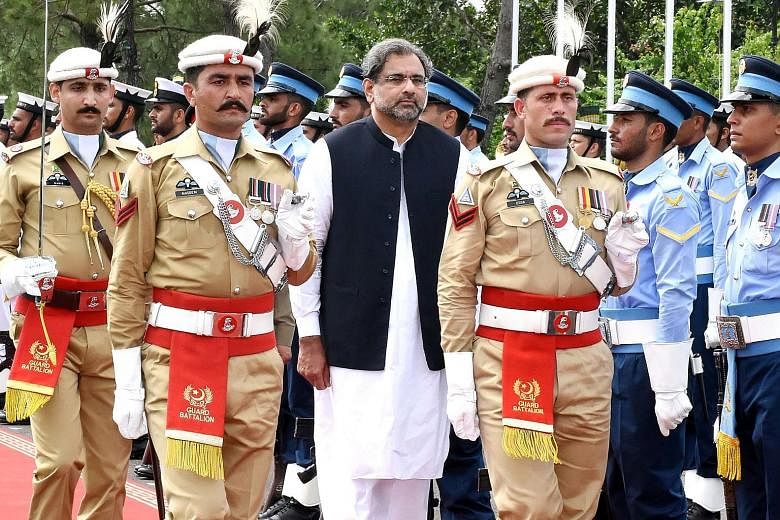The initial reaction of experts to Pakistan's new Prime Minister Shahid Khaqan Abbasi was that he will be little more than a placeholder for his mentor, the ousted Mr Nawaz Sharif.
After all, the new leader left no question about his loyalty when the military overthrew Mr Sharif's publicly elected government in 1999.
Mr Abbasi was in his fourth term in the National Assembly with the ruling Pakistan Muslim League- Nawaz (PML-N) party at the time, and then PM Sharif had appointed him chairman of Pakistan International Airlines (PIA).
Army general Pervez Musharraf, who eventually took over as PM, accused Mr Sharif and Mr Abbasi of conspiring to stop the PIA plane he was on from landing in Karachi in the midst of a coup d'etat after a visit to Sri Lanka.
Subsequently, the military tried to pressure Mr Abbasi, who has family ties to the military, to join its camp by testifying against Mr Sharif. He refused, choosing to go to jail with his boss instead. He spent two years behind bars before being acquitted and released.
After Mr Sharif returned to power in 2013, Mr Abbasi was appointed minister for petroleum and natural resources, a post he held until Pakistan's Supreme Court forced Mr Sharif to resign after disqualifying him from office on corruption charges in late July.
Mr Abbasi, 58, was expected to serve just 45 days and then resign when Mr Sharif's brother, Shahbaz, currently the chief minister of Punjab state, becomes eligible to be prime minister. But on Aug 1, lawmakers elected Mr Abbasi to lead the nation, at least until next year's general election.
Where political headwinds will take Mr Abbasi is anyone's guess, although he has always managed to land safely while engaged in one of his favourite hobbies - skydiving.
Born in Murree, in the Rawalpindi district of Punjab, where he owns property and a restaurant, Mr Abbasi is one of Parliament's wealthiest members, local media reported.
He earned a degree in electrical engineering at the University of California in Los Angeles, and then a master's at George Washington University. After graduation, he worked in the United States and later in Saudi Arabia's oil and gas sectors.
He entered politics after his father, Mr Khaqan Abbasi, an air force commodore who was a minister in the Zia ul-Haq government, was killed in the 1988 blast at an ammunition dump. He ran for his father's seat and was elected to the National Assembly six times, losing once.
Mr Abbasi's romance with the skies continued after his release from prison. In 2003, he set up a budget carrier, Airblue. A bona fide competitor of the PIA, it became Pakistan's most successful private airline. He also had a brief stint as minister for commerce in 2008.
Given all that, Mr Abbasi quickly made clear he has no intention of sitting still until next year's election. The same day that he was elected as PM, he sought to mend fences with the army, telling its chief, General Qamar Javed Bajwa, when they met: "The entire nation is proud of the sacrifices rendered by security personnel in ridding the motherland from the menace of terrorism."
Perhaps of more immediate importance to Pakistan's 193.2 million people is whether he can deliver on his party's promises to end the rolling power blackouts that have plagued Pakistan by November. So he announced on the same day that the nation's power plants in future would focus on the use of liquefied natural gas and coal instead of oil. He already laid the groundwork as petroleum minister and Western firms are flocking to build infrastructure for the switch, Reuters reported.
The former engineer "likes to get his hands dirty" and will be more than a placeholder, Reuters quoted a senior energy official as saying. "He's into results. He often says to us, 'Talk is really cheap, you need to deliver.'"

